Digger wasps are among the insects that could be present in your yard. Unlike most wasp species, digger wasps have very interesting behavior, especially when it comes to parenting.
They also don’t bother humans, but once their population is huge and becomes annoying, you have to eliminate them.
How do you get rid of digger wasps? To get rid of digger wasps, you should remove the attractants and prevent them from digging underground. Adults may be eliminated using a fly swatter. Since larvae live under the soil, you can pour boiling water, boric acid, or bleach on the burrows and cover them with mulch.
Digger wasps are sometimes mistaken for harmful wasps since they share the same habitat. This is why some people are afraid to take immediate action once they see them.
In this comprehensive guide, you will not only learn important facts about digger wasps. You will also know how to control them properly.
What Are Digger Wasps?
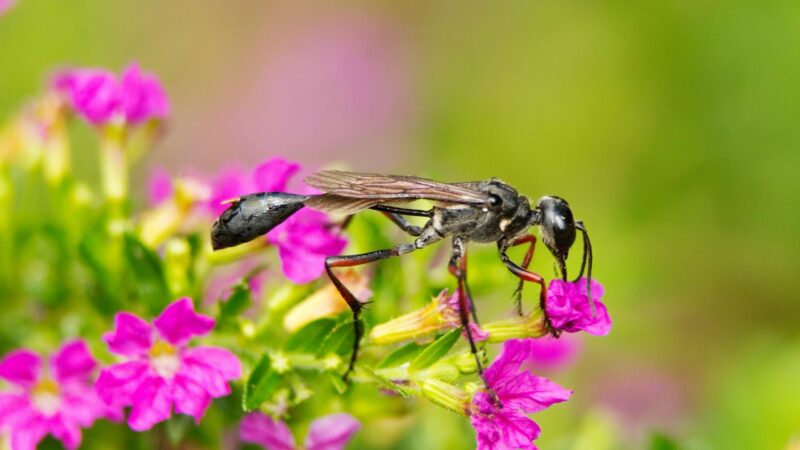
Digger wasps are parasitoids that belong to the family Sphecidae, wherein some of its members have been moved to the family Crabronidae.
The most common digger wasp in the US is the Great Golden Digger Wasp (Sphex ichneumoneus), which is closely related to cicada killers, mud daubers, and sand wasps.
As cosmopolitan wasps, digger wasps are commonly seen in fields, gardens, meadows, parks, and other sunny areas with sand and compacted soil.
As solitary wasps, females work independently in building their nests, raising their young, and finding food. Digger wasps are most active from June to August.
What Do Digger Wasps Look Like?
Great golden digger wasps look like Asian giant hornets (Vespa mandarinia), except they are a bit smaller.
These thread-waisted wasps are 5/8 to 1 inch (15.8 to 25.4 mm) long, with black bodies, black abdomen, dark wings, and red-orange legs. Female great golden digger wasps are quite larger than males.
Both the head and thorax of great golden digger wasps are black and yellow. Their slender bodies are covered with fine, golden hairs, hence the name.
Great golden digger wasps are also quite smaller than cicada killer wasps. Their grub-like larvae are not usually seen since they develop inside their underground nest.
How Do Digger Wasps Make Nests?
To make nests for their eggs, female digger wasps always use a concise pattern. Using their mandibles, they dig cylinder tunnels 4 to 6 inches deep, with a diameter of about one-half inch.
Females usually build up to six nests at once and near each other, with one or two of them as food storage for their young.
In some cases, the prey is too heavy to be carried while flying. Therefore, the mother wasp grasps the prey on its antennae and drags it until she reaches the nest.
Before placing the prey inside the nest, she makes sure that it is safe and comfortable. Then, she will lay eggs inside the nest and will cover it with soil.
What Do Digger Wasps Provision Their Nests With?
Digger wasps provision their nests with paralyzed insects as food for their larvae. This includes aphids, beetles, cicadas, crickets, fleas, grasshoppers, katydids, and spiders.
Sometimes, they leave the prey and will return once the eggs hatch. But in most cases, provisioning is completed only after all the eggs are hatched.
What’s the Life Cycle of the Digger Wasp?
Young digger wasps will begin to leave their nests at the start of the summer. Although they won’t last more than a month, they will use this time to hunt cicadas and begin digging their own nest holes.
The cicadas are added to the nests by the female digger wasps after about a month, and they then lay their eggs on top of the cicadas. After that, the tunnel entrances are sealed off, and the female digger wasp perishes. When it’s time for the larvae to leave the nest and begin hunting cicadas on their own, they will continue to feed on the cicada in the nest into the following season.
How Long Do Digger Wasps Live?
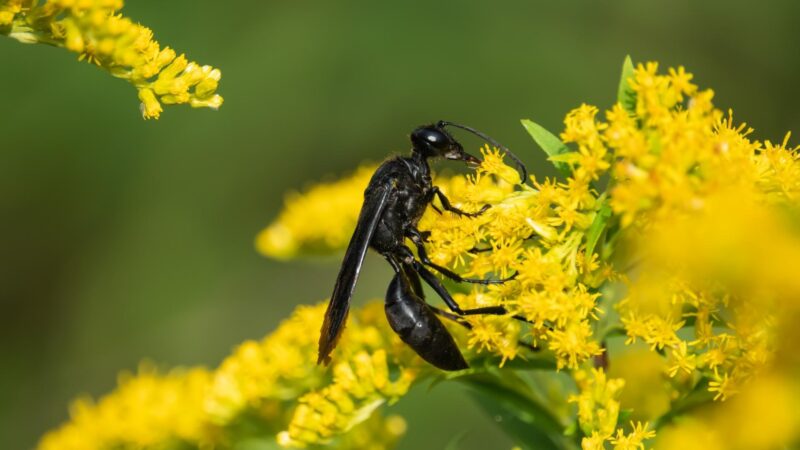
Like giant cicada killer wasps, great golden digger wasps are short-lived. Adult males live for only two weeks and usually die shortly after mating.
On the other hand, females tend to live longer despite working harder than males. These hardworking moms live for about 4 weeks after digging burrows and laying eggs.
Can Digger Wasps be Dangerous for People?
When it comes to people, digger wasps frequently avoid contact. Although they may appear a little menacing when flying over the yard, they are not typically hostile because they don’t naturally defend their nests. They tend not to sting until humans approach them or make an effort to irritate them.
Digger wasps sting to defend themselves if they feel like they are under threat. Because the wasps are so big, their stings can be excruciatingly painful. Compared to other wasps and bees, they rarely sting, but if they do, they could trigger an allergic reaction.
Do Digger Wasps Sting Humans?
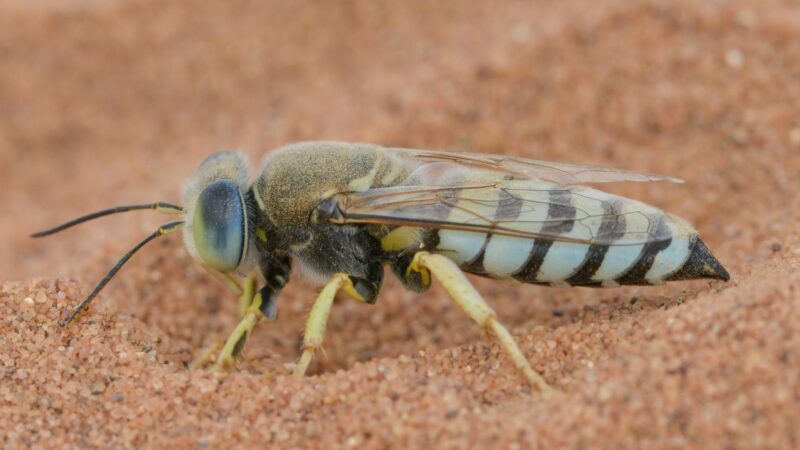
Digger wasps don’t bite or sting humans. Despite their scary looks, they are also not known for carrying diseases and causing damage to structures.
Just like other solitary wasps, they have no colonies and queens to protect. Females have stingers, but they only use them to catch prey so they can feed their young.
What Are Digger Wasps Good For?
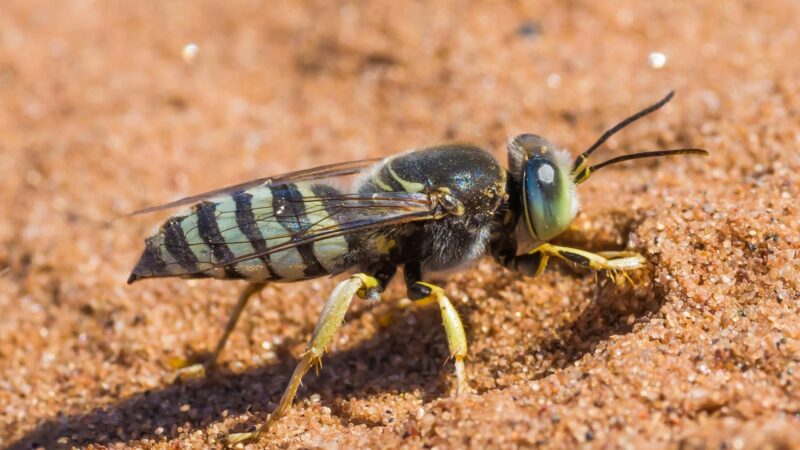
Generally speaking, digger wasps are beneficial to gardens. Females hunt for unwanted pests and insects and sting them until they become paralyzed.
Then, these dedicated mothers bring them to their nests as food for their developing offspring. Therefore, digger wasps are protectors of lawns and gardens.
Adult digger wasps feed on nectar and plant sap, which means that they are also great pollinators. Meanwhile, these wasps have some natural predators.
They are good food for birds, mammals, reptiles, as well as fellow insects such as dragonflies and hoverflies. With this, digger wasps are good for the ecosystem.
What Are Digger Wasps Attracted To?
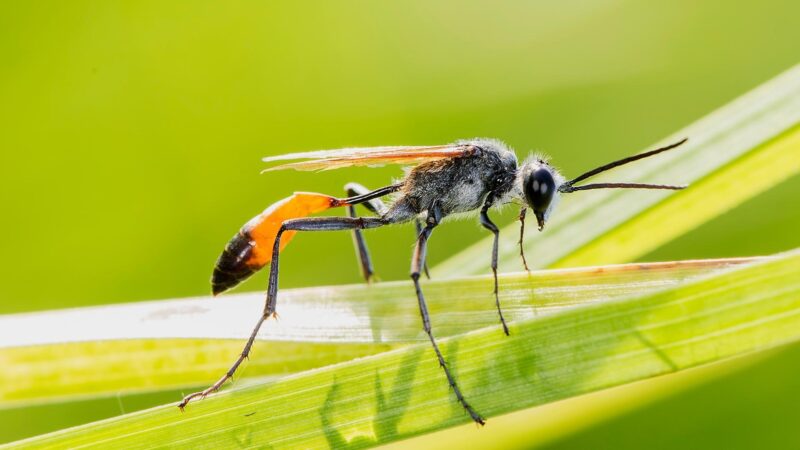
Digger wasps are very attracted to uncovered grounds or open soil with loose sand. For them, this is the ideal place to dig burrows and make nests.
Adults are also attracted to flowering plants since they are their main source of food. Hence, they are also drawn by floral scents and some fruit scents.
What Do Digger Wasps Hate?
Despite not being harmful to humans and the environment, digger wasps can be a nuisance in your garden. Although they cannot damage your lawn completely, the holes these wasps dig can be unpleasant to the eyes.
To stop them from digging holes, here are some things and smells that digger wasps hate so much:
- Wet soil
- Ammonia
- Some essential oils such as clove, geranium, and peppermint
- Vinegar
- Bleach
- Boric acid
- Diatomaceous earth (DE)
Related: Scents Wasps Hate | All You Need to Know!
Are the Digger Wasps Damaging Your Lawn?
Although they may dig nests down to a depth of approximately two feet, digger wasps typically make nests that have an aperture about the size of a quarter and extend about six inches into the earth. The average digger wasp colony may hold up to six individuals, but if several wasps are nesting adjacent to one another, the yard may become more infested with holes.
The yard’s holes may aid in soil aeration. But if there are too many digger wasps nesting nearby, the grass could get harmed by the nesting holes that are all concentrated in one place. Digger wasps may be responsible for a number of different holes in the yard that homeowners have seen. To safeguard their grass, they should understand how to get rid of them.
How to Kill Digger Wasps?
Since digger wasps are beneficial to the environment, killing them is not always necessary. These wasp species are low fliers, and you can easily find their nests.
Covering their underground nests with cement may work but it is not always an ideal solution. Here are some simple ways to kill adult digger wasps and larvae:
- For adult digger wasps, kill them with fly swatters such as Kensizer Heavy Duty Fly Swatters .
- Eco-Friendly - Premium PP material, harmless to your health....
- Flexible & Lightweight - It won't be broken off even make it bend...
- Durability - Non-slip thick handle helps you swat fly at a faster...
- Space Saving - Designed with hole, can be hung with the included...
- Quality assurance - You can get one replacement if they are all...
- Sprinkle Harris Food Grade Diatomaceous Earth on the entrance of the nests. Once digger wasp larvae walk on the DE, it will penetrate their exoskeleton, causing them to eventually die of dehydration.
- 100% Chemical-Free: Made from 5lbs of food-grade freshwater...
- OMRI Listed for Organic Use: Certified by the Organic Materials...
- Powder Duster Included - Powder duster in the bag for easy and...
- Powder Duster Included for Easy Application: Comes with a powder...
- Sourced and Packaged in the USA: Responsibly mined in Nevada and...
- Pour ammonia, boric acid, or bleach into the nests, especially at night when digger wasps are inactive. However, this will only kill larvae, not the eggs.
- If you have lots of plants that could be damaged by harmful chemicals, use pyrethroid insecticides, such as Southern Ag Natural Pyrethrin Concentrate .
- For use on Most insects
- Can be used as a Dog Dip
- Controls insects on fruits and vegetables
- Alternatively, pour boiling water into the nests to kill them, including the eggs. Cover the hole quickly with the glass, and leave it overnight.
Pesticides For Digger Wasps
There are still a few further methods you can attempt before hiring a professional if the domestic products are unable, for whatever reason, to get rid of these insects. With these techniques, you must buy a pesticide of professional quality and apply it yourself.
Hornet Spray
- KILLS ON CONTACT: Hot Shot Wasp and Hornet Killer controls wasps,...
- UP TO 27 FOOT JET SPRAY: With a jet spray that reaches up to 27...
- NON-STAINING: This product is non-staining to most home siding...
- FOR OUTDOOR USE: Apply at sunset when insects are least active.
- AEROSOL SPRAY: Water-based formula eliminates the nest.
A number of hornet sprays are available for purchase; they can shoot up to 25 feet and deposit a significant amount of hornets into each hole. Aim carefully and leave yourself some room since these wasps will defend their homes and attack you if you disturb them. You should put on some sort of protective clothing, as advised.
Demon WP
- Quick knockdown and long-lasting - 90+ day residual
- Can be used inside and out
- Size: 1 Envelope contains Four 9.5 gram water soluble packets
- Yield and Mixing: One 9.5g packet mixed with 1 gallon of water...
- Target Pest: Ants, Aphidsc, Assassin Bugs, Boxelder Bugs,...
- Quick knockdown and long-lasting - 90+ day residual
To use this pesticide, combine one packet of Demon with one gallon of water, then pour the mixture into a sprayer. It is advised that you apply this spray from July to September so that you can catch the wasps early in their cycle of life. Three months’ worth of use can be gotten out of this spray.
Pyrethrin-based Powder
- CONTAINS: Pyrethrin for quick knockdown and Silicon Dioxide which...
- HOW IT WORKS: Powder clings to the body hairs of insects and is...
- LONG LASTING: Works up to 6 months after application
- EFFECTING AGAINST: Cockroaches, Ants, Earwigs, Ticks, Bedbugs,...
- ACTIVE INGREDIENTS: Silicon Dioxide 60%, Piperonyl Butoxide 10%...
This is much less expensive than hiring an exterminator. You can sprinkle this powder all over the nest. Until the dust settles, make sure to keep kids and pets away.
Drione Dust
- Pyrethrins 1.0%, Piperonyl Butoxide 10.0%, Silica Gel 40.0%
- Drione Dust is for use in and around Residences, Institutions,...
- Ready to use
This dust has pyrethrum in it naturally and is silica-based. Wasps are instantly killed, and it even captures their scents and pheromones. This aids in limiting the entry of further wasps.
Cypermethrin
- KILLS ON CONTACT: Hot Shot Wasp and Hornet Killer controls wasps,...
- UP TO 27 FOOT JET SPRAY: With a jet spray that reaches up to 27...
- NON-STAINING: This product is non-staining to most home siding...
- FOR OUTDOOR USE: Apply at sunset when insects are least active.
- AEROSOL SPRAY: Water-based formula eliminates the nest.
If your yard contains a lot of nests, you can think about utilizing a liquid concentrate. This pesticide mixture has a two to four week shelf life. Eggs and larvae can be killed with it as well.
How Do You Get Rid of Digger Wasps Naturally?
Once again, you don’t have to kill digger wasps. If you want to drive them away and prevent them from coming back, remove all the things that attract them and don’t give them reasons to stay long.
Since using chemicals and pesticides can harm your plants and pets, here are some natural ways to get rid of digger wasps:
- Water your lawn or garden regularly. Digger wasp larvae will get drowned, and adults will no longer go back to their nests.
- Add a layer of fine gravel on your lawn, so females cannot dig underground.
- Plant more grass seeds. Thick grass doesn’t only control digger wasps, it also makes your lawn healthier.
- Mulching your garden bed at about 3 inches deep also helps prevent these wasps from digging.
- Get rid of garden pests such as cicadas, grasshoppers, and katydids. If there is a shortage of food, digger wasps will move to another place.
Related: How to Get Rid of Wasps in the House? | Information and Facts
Frequently Asked Questions
How Did Digger Wasp Get Its Name?
Digger wasps got their name because of their digging behavior. As mentioned above, they dig burrows to make nests for their offspring.
They also dig the soil to search for scarab larvae, which are also food for their developing larvae. Female digger wasps also sting and paralyze scarab larvae and bring them to their nest.
Do Digger Wasps Fly High?
Digger wasps don’t fly high. Instead, they fly low to the ground so they can easily catch grubs and larvae. Digger wasps also fly close to their nests so they can protect their eggs in their nests.
Interestingly, even males fly low but faster than females. This is why you will see more flying females than males.
Are Digger Wasps Aggressive?
Both male and female digger wasps are not aggressive insects. Although they tend to defend themselves, male digger wasps don’t have stingers.
Males are very territorial and will fight and chase other small insects that will come near their space. Females are aggressive but only to their prey and not to humans.
Some people claim that female digger wasps sting, but still, it does not affect humans. It is also very unlikely to happen since they tend to avoid humans, and they also don’t defend their nests.
If you spot some of them fighting each other, they are likely to be males. On the other hand, females share the same area.
Sources
Lewis, D. (2020). Lots of Digger Wasps; No Asian Giant Hornets. Iowa State University Extension and Outreach.
Orr, D. (2018). Digger Wasps. NC State University.
Hawkinson, C. (2005). Great Golden Digger Wasp. Texas A&M University.
Great Golden Digger Wasp. Missouri Department of Conservation.
Hahn, J., Walker, J., Weisenhorn, J. (2021). Solitary wasps. University of Minnesota Extension.
- Bed Bug Surge 2025: How to Detect, Prevent, and Safely Eliminate Infestations in Top U.S. Cities - June 18, 2025
- Asian Needle Ants Invade US Homes: 2025 Guide to Identification, Risks, and Effective Control - June 11, 2025
- New World Screwworm Alert: How US Livestock Owners Can Prevent Outbreaks and Protect Herds [Summer 2025 Update] - June 8, 2025








